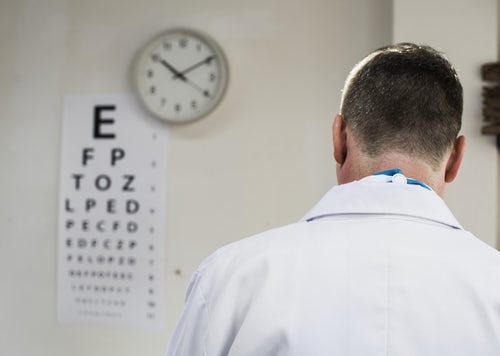Contact Lenses: Dos & Dont’s
In recent weeks, there has been a lot of press around Acanthamoeba keratitis – an infection which enters the eye through contact lenses and can cause vision loss. Headlines on ITV News warned ‘blindness-causing eye infection sparks contact lens warning’ and The Express also foresaw pending doom for contact lens wearers carrying the headline ‘OUTBREAK: UK hit by spread of eye infection that can cause blindness’.
Acanthamoeba keratitis is commonly spread by water and as a contact lens wearer you can put yourself at risk by going swimming in your lenses or leaving your lenses in domestic tap water overnight rather than using your contact lens solution. Symptoms of Acanthamoeba keratitis include severe headaches, reddening of your eye, excessive tearing, pain in your eye, and a feeling that something is in your eye.
However, Medstars spoke with consultant ophthalmologist Professor Sunil Shah, President of The British Contact Lens Association, to find out if the risks posed by this infection are as grave as the headlines make out.
Professor Shah advises, “The risks mentioned in recent headlines are liable to misinterpretation, as they are only based on figures from one hospital (Moorfields) and so we only see a snapshot. If you analyse the data another way, the infection rate is proportionate to the increase in use of contact lenses and so it is difficult to extrapolate data which supports the claims of an ‘outbreak’ made by the press. That being said, contact lens wearers should always take stringent hygiene precautions to protect their eyes from infections.”
So, here are our ‘dos and don’ts’ for contact lens wearers…

Do
- Always wash and dry your hands thoroughly before inserting a contact lens – This may seem basic, but any bacteria which have not already been thrown into eternal oblivion by assiduous washing and drying, will be squished into your eye via your contact lenses, if you do not take these precautions.
- Insert lenses into your eyes as soon as you remove them from their packaging or your lens case – while you can’t guarantee a completely sterilised environment, particularly if you are out or at work, you never know which bacteria could be lurking on any surface you place your contact lenses on. This is particularly important if you are using a public restroom.
- Immediately seek help, if your lenses give you any problems or swelling – Swelling or redness could be signs of an infection. The sooner you get your symptoms checked out by an ophthalmologist, the lower the risk of long-term damage to your vision will be.
- Only wear contact lenses that have been professionally fitted by your optician. Poorly fitted lenses not only significantly increase your risk of an eye infection but can also wreak horrendous long-term damage on your cornea which may ultimately lead to loss of vision. According to Professor Shah, “Study after study has shown that wearing daily lenses can reduce wearers’ risks of infection, compared to monthly lenses, if proper precautions are taken regarding insertion and care of the lenses.”
- If you wear monthly lenses, be sure to clean them after every use, using your lens cleaning solution – Forgetting for one day could leave you facing a future with Acanthamoeba keratitis. It is vital that you use a fresh solution every day to ensure that no stray germs find their way into your eyes via a topped-up or reused lens cleaning solution.

Don’t
- Use your lenses in a swimming pool, hot tub, sauna, or jacuzzi – Water adds so much to our lives. Unfortunately, it also adds a cornucopia of germs to your contact lenses. You don’t know who was using the swimming pool before you. Imagine if someone urinated in the pool just before you used it. You probably don’t want those germs attached to your contact lenses and entering your eye every time you insert your lenses for the rest of that day. Discussing the risks exposure to water poses to contact lenses and their wearers, Professor Shah commented “Even filtered water still carries bacteria. Your eyes are vulnerable to infection if they are exposed to these bacteria through your lenses.”
- Clean anything associated with your contact lenses, whether that be the lenses themselves, or their case (if you prefer monthly lenses) with tap water – The acanthamoeba responsible for the devastating infections described above, are found throughout water supplies in the UK. While intending to clean your lenses with tap water, you could just be dousing them in infectious, and potentially blinding bacteria.
- Wear novelty lenses – These contact lenses have become popular over the last decade after appearing in pop music videos and appearing to make wearers’ eyes look bigger. However, these lenses carry huge risks to your vision, as they are likely to scratch your corneas, and could cause you a range of serious health issues ranging from eye infection, to corneal ulcers, to loss of vision. When asked about these lenses, Professor Shah recalled memories of treating teenagers blinded after wearing these lenses. He said “novelty lenses are often not manufactured to the same standard as normal contact lenses and are available at market stalls and petrol stations without a warning that they may blind. They are very dangerous.”
- Pour your contact lens cleaning solution into travel-sized bottles – These bottles have not been sterilised. You could be dunking your contact lenses into a well filled with varied, active, and highly infectious germs by cleaning them with a solution decanted into one of these bottles.
- Temporarily disregard your ophthalmologist’s advice because ‘a few days won’t make a difference’- Your ophthalmologist has dedicated years of their life to studying eyes. They understand contact lenses inside-out and outside-in. Their advice is designed to protect your eye-health and give you the highest quality of vision possible. Following their advice will help you to see more clearly and stay free from eye infections.
Your eyes are two of the most important organs in your body. Without them you would be unable to see your family, your friends or your kids grow up. If you ever experience prolonged redness, soreness or swelling around your eye, even if your vision is usually perfectly fine, please see your GP or an ophthalmologist. Treating eye problems earlier can prevent minor issues from escalating into serious injuries and infections which can cost you your vision.

You can no longer book an appointment with Professor Sunil Shah via Medstars. However, you can book an appointment with one of our expert eye specialists below:
Medstars Medical Concierge Service
Looking for extra guidance when it comes to your healthcare? Sometimes interpreting medical information and making the best decisions can be daunting and complicated. Our private medical concierge service provides easy access to top UK health experts. We guide our patients with genuine choice and trust, offering a bespoke service for anyone in the world seeking private UK healthcare. Learn more about Medstars Medical Concierge Service. Want to learn more about providing our medical concierge service as an employee benefit? Learn more about Medstars Medical Concierge for Business.

